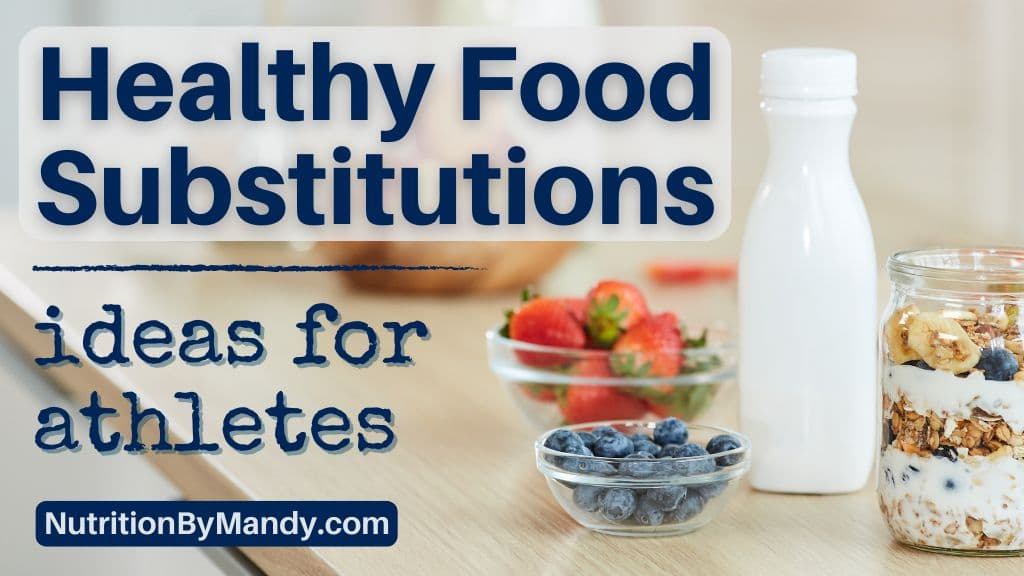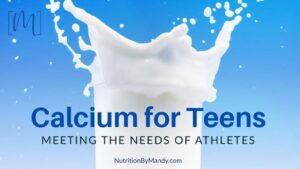Last Updated on October 6, 2025 by Mandy Tyler, M.Ed., RD, CSSD, LD
10 Healthy Food Substitutions for an Athlete’s Diet Plan
It can be helpful for athletes to have ideas for healthy food substitutions to include in their meal plans. Making small, nutritious changes can add up significantly and positively impact an athlete’s overall nutrient intake.
Check out these 10 ideas for healthy food substitutions for an athlete’s diet plan.
Healthy Food Substitution #1: Greek Yogurt
Greek yogurt is first on the list of healthy food substitutions for an athlete’s diet plan.
Substituting Greek yogurt for regular yogurt is an easy way for athletes to boost the protein content of their meals and snacks.
To provide a comparison, a 5.3 oz (150 g) individual container of Greek yogurt contains ~13 grams of protein (1). A similar amount of regular (non-Greek) yogurt provides only ~5 grams of protein (2).
Ideas for Adding Greek Yogurt to an Athlete’s Diet
Athletes can use Greek yogurt to make a fruit and yogurt parfait, include it in a fruit smoothie, or use it as an ingredient in protein overnight oats.
Unflavored, non-fat Greek yogurt can also be used as a substitute for sour cream. This is an easy way for athletes to add protein and decrease the saturated fat content of their favorite meals.
Pro Tip: Consider trying Greek yogurt in place of sour cream as a protein-rich topping on baked potatoes or chili.

Healthy Food Substitution #2: Lean Ground Beef
Next on the list is substituting lean ground beef (93% lean/7% fat or leaner) for regular ground beef (70/30 or 80/20) in recipes.
This is an easy way for athletes to decrease the saturated fat content of their favorite meals. A 4-oz serving of 93% lean ground beef contains ~3 grams of saturated fat (3). While a 4-oz serving of 80% lean ground beef contains ~13 g of saturated fat (4).
Add High-Quality Protein to an Athlete’s Diet with Lean Ground Beef
Beef is a source of high-quality complete protein. A high-quality protein provides all of the essential amino acids that our bodies cannot produce (5).
A 4-oz serving of lean beef provides ~ 24 grams of protein (3), which can help support athletes with meeting their daily protein needs.
In addition to being a source of high-quality protein, beef also provides many vitamins and minerals that are important for health, including: B-Vitamins, iron, zinc, and selenium (3).
Healthy Food Substitution #3: Whole Grain Bread
Whole grains are a great way for athletes to add carbohydrates, fiber, vitamins, and minerals to their diet.
Athletes should look to purchase whole grain breads, bagels, English muffins, tortillas, wraps, and flatbread. When selecting whole grain items, it is important for athletes to read the package to ensure the product is whole grain.
Athletes should review the ingredient list and ensure the word “whole” is listed as the first ingredient in the product. For example, look for products containing whole wheat, whole oat, or whole rye.
Pro Tip: Dave’s Killer Bread® has a variety of whole grain bread items available, which are great options for athletes.
Healthy Food Substitution #4: Brown Rice
In addition to whole grain bread, switching to brown rice is an easy way for athletes to add whole grains to their meal plan.
At home, I encourage athletes to purchase brown rice for use in their favorite recipes or to enjoy as a side item with meals. If shopping on a budget, athletes can purchase a large bag of brown rice to keep on hand in their pantry.
Many restaurants now offer brown rice as an option to order with meals. Athletes can opt for brown rice in their burrito bowl at Chipotle, include it in their grain bowl at CAVA, or order it as a side with their stir-fry at Pei Wei.
Pro Tip: Ingredient prep a large batch of brown rice on the weekend to enjoy with meals throughout the week.

Healthy Food Substitution #5: Choose Broth-Based Soups
Soup can be a great addition to an athlete’s meal plan. Since soups are traditionally high in sodium, they can help athletes with replacing the sodium lost in sweat during activity.
I like to include soups in a team’s post-game meal. Since soup provides both fluid and sodium, it can support athletes with meeting their rehydration needs following activity.
Add Broth-Based Soups to an Athlete’s Meal Plan
I recommend that athletes choose broth-based soups, over soups made with cream or cheese, to include in their meal plans. Broth-based soups tend to be lower in saturated fat. Thus, they are a healthier option for athletes.
In addition, selecting soups that contain noodles, rice, potatoes, or beans, can support athletes with meeting their carbohydrate needs.
Some of my favorite broth-based soup options for athletes include:
- Chicken noodle
- Chicken and rice
- Beef barley
- Beef vegetable and rice
- Pasta fagioli
- Minestrone
Note: Athletes who have been advised to restrict sodium in their diet should work with a sports dietitian nutritionist to develop an individualized plan for meeting their sports nutrition needs.
Healthy Food Substitution #6: Bagels
Substituting bagels for croissants or donuts is a nutritious way for athletes to add carbohydrates to their meal plan.
A large deli-style bagel can contain over 60 grams of carbohydrates depending on the flavor and brand (6). Thus, it can make a great high-carb addition to an athlete’s breakfast.
In addition, bagels are generally low in fat, while croissants and donuts tend to be high in saturated fat. Since fat slows down digestion, eating foods high in fat too close to the start of activity can lead to GI distress during the event (7).
Add Carbohydrates to an Athlete’s Meal Plan with Bagels
I recommend athletes eat bagels with their breakfast before morning practice to provide them with the quick energy needed for the upcoming workout.
Bagels can also make a great high-carb snack or can be used to make a sandwich for a healthy grab-and-go lunch.
Note: Athletes should note that they can still enjoy croissants and donuts in their meal plan. I would just recommend they enjoy them as a treat on occasion rather than as part of their daily breakfast.
Healthy Food Substitution #7: Nut Butter
Athletes looking for a quick healthy change to their morning meal can substitute nut butter in place of butter or cream cheese on their bagel.
Nut butter is a nutrient-rich, calorie-dense food option for athletes. It provides protein, healthy unsaturated fat, vitamins and minerals, making it a nutritious addition to an athlete’s diet. In general, a 2-tablespoon serving of peanut butter provides ~7 grams of protein (8).
When selecting a nut butter, athletes should choose one that contains limited added ingredients aside from nuts.
Pro Tip: In addition to bagels, peanut butter is a healthy topping for toaster waffles, rice cakes, whole grain crackers, apple slices, and celery.
Healthy Food Substitution #8: Guacamole
When selecting what to use as a topping on a burrito bowl, tacos, or quesadillas, I encourage athletes to opt for guacamole over queso or sour cream.
Substituting guacamole is an easy way for athletes to decrease the saturated fat content of their meal and increase their intake of healthy fats, vitamins, minerals, and fiber (9).
The majority of fat found in avocados is monounsaturated fat, a type of healthy, unsaturated fat. Avocados also contain many vitamins and minerals, including the electrolyte potassium (9).
Potassium helps the body transmit nerve signals, maintain fluid balance, and plays an important role in muscle contraction (10).
Pro Tip: Athletes can also use guacamole as a nutritious spread on a sandwich or a healthy dip paired with fresh veggies, pita chips, or pretzels.

Healthy Drink Substitution #9: High-Protein Milk
Switching to ultra-filtered, high-protein milk is an easy way for athletes to add protein to their diet plan
Ultra-filtered, high-protein milk, such as Fairlife® and HEB Mootopia®, are filtered to remove the lactose and contain a concentrated protein and calcium content.
A cup of ultra-filtered milk provides ~13 grams of protein compared to 8 grams in a cup of regular milk (11, 12). Similar to beef, the protein in milk is considered a high-quality, complete protein (5).
Athletes can enjoy high-protein milk as a drink with their meals or snacks, include it in a smoothie to boost the protein content, use it as an ingredient in overnight oats, or enjoy it in a bowl of whole grain breakfast cereal.
Healthy Drink Substitution #10: Sparkling Water
Hydration is important for an athlete’s health as well as sports performance. A healthy beverage substitution that I encourage athletes to make is switching to unsweetened sparkling water in place of soda.
Soda and other sugar-sweetened beverages provide calories without other nutritional benefits, such as vitamins and minerals. For example, a 12-oz soda contains ~150 calories and 40 grams of sugar (13), but lacks other nutrients such as vitamins, calcium, protein, or fiber.
The added sugar in these beverages can lead to dental concerns, such as tooth decay and cavities. In addition, the excess consumption of calories from these drinks can lead to unwanted weight gain and is associated with an increased risk of obesity and other chronic diseases (14).
Drinks to be mindful of that typically contain large amounts of added sugar include:
- Soda
- Lemonade
- Fruit punch
- Sweet tea
- Slushies
- Frozen coffee drinks
I find that many athletes enjoy having a drink with carbonation. Unsweetened sparking water is a great way for athletes to fill this desire without the added sugar contained within a soda.

10 Healthy Food Substitutions for an Athlete’s Diet Plan
You are now set with a variety of healthy food substitutions for an athlete’s diet plan. Consider trying out these healthy food swaps in your meals and snacks throughout the upcoming week.
For additional sports nutrition tips, make sure to check out my blog healthy fast-food options for athletes.
Join the Nutrition By Mandy Email List & Get a Free Weekly Meal Planner Template
Click HERE to join the Nutrition By Mandy e-mail list. When you join you will receive a free weekly meal planner template to download and plan out your meals for the week.
About the Author
Mandy Tyler is a Sports Dietitian Nutritionist in the San Antonio, TX area. She is a Registered and Licensed Dietitian, a Board-Certified Specialist in Sports Dietetics, a Licensed Athletic Trainer, and is a Certified Exercise Physiologist through the American College of Sports Medicine. Mandy has experience working with athletes at the high school, collegiate, and professional levels. She believes the key to reaching one’s full potential, both in everyday life and in sports performance, relies on a healthy nutritional foundation.

If you are looking to take your performance to the next level, make sure to check out my new Sports Nutrition Game Day Guide. This downloadable guide is written to help athletes develop an individualized plan to achieve peak performance on game day.





